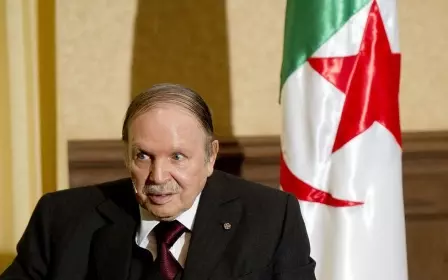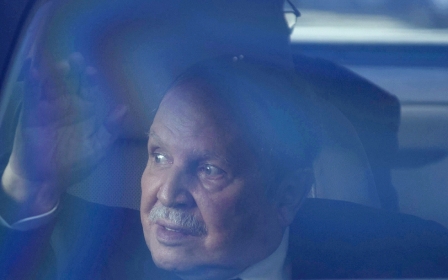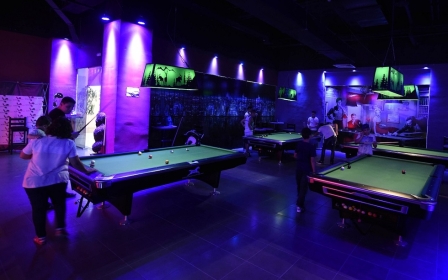ANALYSIS: Life after Toufik

ALGIERS - In Algeria, one mysterious figure is replacing another. On Sunday, 13 September, the Algerian presidency officially "retired" Mohamed Lamine Mediene, the head of the secret service and the country's most powerful military officer known as "Toufik". He was replaced by a retired major general, Athmane Tartag, known as "Bachir," of whom only fake photos are to be found in the media.
Members of the general public know little about the new head of the Algerian Department of Intelligence and Security (DRS), aside from his terrible nicknames including "the Butcher" or "the Bomber" and his reputation as a “hothead”.
But who is he really? "He was born in el-Eulma, near Setif, in the east of Algeria," explained a DRS officer to Middle East Eye.
"He was recruited in the 1970s by the Securite Militaire (the forerunner of the DRS) while he was still at university," continued a presidential adviser.
Despite the absence of an official biography, those who know him claim that he went to Russia to be trained – with the KGB – just like Mediene.
"However, he earned his reputation when he managed the notorious Centre Principal Militaire D’investigation – the leading centre of military investigation - (CPMI) in the 1990s," continued the DRS officer. "This organisation handled investigations into military affairs. His role in the fight against armed Islamists was assigned to him afterwards. Tartag was a source of terror for both the Islamists and for corrupt army staff."
Torture
What happened under his reign at the centre was certainly not appreciated by the human rights NGOs, who condemned the "excesses and torture" occurring there.
In its report "La machine de la mort," published in 2003, Berlin-based NGO Algeria Watch wrote: "From 1992 [when Tartag took over] the CPMI was one of the main centres for the torture and elimination of opponents.”
The president of Amnesty International Algeria, Hassina Oussedik, told MEE that her organisation has always believed that "the secret services have broad powers to arrest people and order incommunicado detention, which naturally encourages torture and ill-treatment".
"It's also quite strange," explained a lawyer specialising in the defence of human rights, requesting anonymity, "that the highest ranked officer most condemned by the international NGOs is placed in the spotlight at the head of such a sensitive department".
According to a source close to President Abdelaziz Bouteflika, who appointed Tartag as a security affairs adviser last year, the man mentioned in the NGOs’ reports is not the man that he has met. "Tartag has nothing of the surly army officer. He is a pleasant, cheerful and almost shy person," the source said.
At the DRS, a member of the operational staff who has met Tartag several times said: "Yes, he is really warm and friendly. But like all army men, he has two separate personalities. Inside the organisation, he is a harsh man, firmly convinced that what he is doing is right. A field expert whose speciality is surveillance and intelligence. A real hawk, unlike Mediene, who has a gentler character."
Calculation and reward
Tartag's reputation was enhanced by the handling of the crisis at the Tiguentourine gas facility in January 2013, when hostages were taken by el-Mouaquine Biddam, an armed group that splintered from al-Qaeda in the Islamic Maghreb. He was second-in-command at the DRS, where Bouteflika had named him interior security director (DSI) in 2011.
"He was the one who managed the military intervention which the international media described as the ‘Algerian-style attack’ after several foreign hostages were killed," remembers one of his staff amusingly. "For his part, Ahmed Gaid-Salah, the head of the [army's] General Staff, wanted to drag out the negotiations. But Tartag refused and launched the attack. The DRS and General Staff were really waging war against each other."
In the corridors of the "firm," his promotion is welcomed by some as good news.
"The executive staff were sick of seeing Mediene allowing the DRS to be stripped of its departments," explained an officer to MEE, referring to the restructuring process launched two years ago by Bouteflika, which transferred some departments from the DRS to the army's General Staff, considered loyal to the president, and shut down others.
"Although we know that Toufik is a KGB man, that intelligence is his core business and that the departments taken from him are not the most important in his eyes, the transfer of the departments to the General Staff was viewed by the men as a humiliation."
For other members of the DRS, the fact that Tartag had allied himself with Bouteflika by working as a presidential adviser (despite the fact the president retired him from his duties as number two at the DRS in 2013) is an "act of treason" at a time of tension between the presidency and the DRS.
"Tartag wanted to take Mediene’s place. It is thanks to him that Bouteflika was able to dismantle the DRS," a high-ranking retired officer told MEE. "Everything was carefully planned from the start. Giving him the secret services was his reward."
'The worm in the fruit'
An intelligence officer contacted by MEE affirmed that the treason hypothesis is just "a new smokescreen to make everyone believe that the presidential clan is still strong".
“The theory that Mediene was replaced because Tartag is a traitor simply doesn't stand up. Instead, I see Tartag more as a ‘worm in the fruit.’"
"Don't forget that infiltration is his trade. How could a 65-year-old man, who has been at the heart of the fight against terrorism, join forces through conviction with a group which has chosen to help the Islamists?" he asks, in reference to Bouteflika, who is suspected of wanting to clear the hard-liners of wrongdoing.
"Believe me, when Mediene left, he picked his successor," he continued.
Indeed, many people believe that a man as powerful as Mediene could not be so easily removed, as he was the supreme leader of the secret services and a partner of foreign intelligence services, including the CIA, in the "War on Terror". It was he himself who created the DRS in 1990. It is therefore highly likely that when he left he wanted to ensure that the "firm" was in good hands.
"And he left, personally assuming the break-up of some departments and a number of very hot, sensitive files in his boxes!"
Since 1990, Toufik, a product of the Ministry of Armament and General Liaisons (MALG) - the secret service which waged war against France during the War of Independence - and of the Russian KGB, has built up compromising files on just about everyone, but has always kept quiet to ensure the "smooth running of the state".
Nevertheless, one of the Bouteflika's staff based in Zeralda, where the president has a residence, says he has never particularly liked Mediene but also insists that "the head of the DRS retired at his own request".
"He could always come back as some sort of super departmental coordinator," he added.
"At a time of restructuring within the DRS and faced with the latest security threats, not forgetting an economic crisis and the looming issue of Bouteflika’s succession, the new head of the department has plenty of challenges ahead of him."
Although the issue of the presidential succession in Algeria is decided on a collegial basis, Mediene’s departure may imply that Bouteflika alone will decide the future. This is by no means certain as the armed forces and intelligence services have been the historical backbone of the government.
"Finally, this is nothing faced with his main challenge … life after Toufik,” he concludes.
New MEE newsletter: Jerusalem Dispatch
Sign up to get the latest insights and analysis on Israel-Palestine, alongside Turkey Unpacked and other MEE newsletters
Middle East Eye delivers independent and unrivalled coverage and analysis of the Middle East, North Africa and beyond. To learn more about republishing this content and the associated fees, please fill out this form. More about MEE can be found here.




